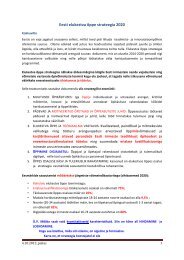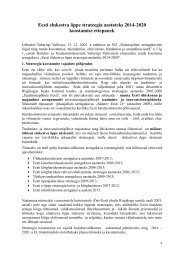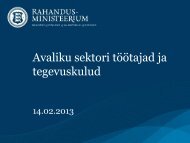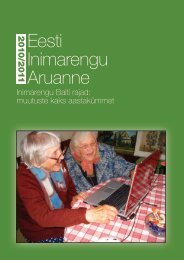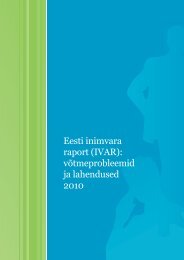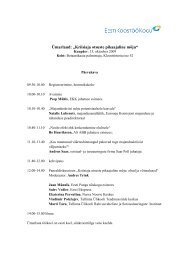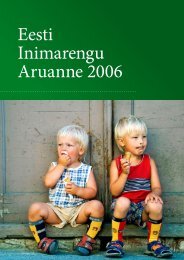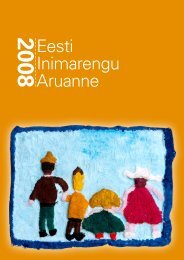Estonian Human Development Report
Estonian Human Development Report - Eesti Koostöö Kogu
Estonian Human Development Report - Eesti Koostöö Kogu
You also want an ePaper? Increase the reach of your titles
YUMPU automatically turns print PDFs into web optimized ePapers that Google loves.
Attitudes and beliefs related to the<br />
Internet<br />
As we have seen in the previous subchapters, the Internet<br />
plays a very important role in the use of time and the daily<br />
lives of young people in Estonia, in addition to having a<br />
considerable influence on their lifestyles. Thus we consider<br />
it important to take a closer look at the beliefs related<br />
to the Internet.<br />
The importance of the Internet in the lives of <strong>Estonian</strong><br />
school pupils is reflected in the excessive self-confidence<br />
and overwhelmingly positive attitudes of the young people<br />
in question. More than 90% of the school pupils polled<br />
in autumn 2007 were confident in their ability to use the<br />
Internet for any purpose (see Table 5.4.5.). The trustworthiness<br />
of the Internet as a source of information is relatively<br />
high, having experienced a considerable growth<br />
compared to the survey data dating back to 2005: 72% of<br />
school pupils considered the information available online<br />
trustworthy in 2007 (compared to 41% in 2005). During<br />
the two years, the Internet surpassed television in terms<br />
of reliability, rising to the 6 th position after family members,<br />
reference literature, school textbooks, teachers, and<br />
friends. In addition to television, school pupils also have<br />
less confidence in radio as well as newspapers and magazines<br />
than in the Internet. Although the majority of pupils<br />
are critical of the credibility of forum entries posted anonymously,<br />
as many as one third of <strong>Estonian</strong> young people<br />
take this source of information seriously.<br />
<strong>Estonian</strong> pupils mainly see the Internet as a source of<br />
opportunities: a large majority (83%) considers the information<br />
they obtain from the Internet to be important in terms of<br />
their studies. This percentage has increased somewhat since<br />
2005. Pupils generally believe (as indicated by a stable percentage<br />
of respondents over a period of two years) that the<br />
role of the Internet in allowing children to learn about the<br />
world faster is positive. A little over half of the pupils sense<br />
that this opportunity may be connected to the danger of children<br />
experiencing the unpleasant side of the world of adults<br />
through the web at an unsuitably early age, while a third of<br />
the respondents do not consider this to be a problem.<br />
Survey results allow us to postulate that <strong>Estonian</strong> children<br />
see the Internet more as a separator of generations<br />
than a means of uniting them, although this opinion is<br />
changing. Compared to 2005, the percentage of pupils<br />
who believed that adults do not understand what children<br />
do online had decreased somewhat in 2007, while<br />
the percentage of pupils that disagreed with this statement<br />
showed some growth. A little over a half of the respondents<br />
saw the Internet as a bridge between the generations and<br />
a means of facilitating mutual understanding. It is worth<br />
noting that compared to 2005, the pupils’ opinion of their<br />
teachers’ Internet skills has improved significantly. At the<br />
same time, pupils tend to consider their parents to be more<br />
familiar with the Internet than their teachers. A considerable<br />
segment of school pupils (36%) believed that the<br />
Internet allows younger generations to outpace older generations<br />
in terms of knowledge, although the percentage<br />
of those who did not agree with this statement was somewhat<br />
larger (51%).<br />
The relative importance of attitudes related to gender<br />
stereotypes has remained relatively stable during the two<br />
years. In the case of both of the surveys, nearly one fourth<br />
of the respondents thought that the early use of comput-<br />
Table 5.4.5. Attitudes and beliefs related to the<br />
Internet of 6 th to 12 th year pupils of city schools with<br />
<strong>Estonian</strong> language instruction (%)<br />
I can use the Internet very well (for any<br />
purpose)<br />
The information found on the Internet is<br />
trustworthy*<br />
2007 2005<br />
Do not Do not<br />
Agree Agree<br />
agree agree<br />
91 7 - -<br />
72 24 41 47<br />
I trust anonymously posted forum entries 34 57 - -<br />
Information obtained from the Internet is<br />
important for studying<br />
It is good that the Internet allows children<br />
to develop and discover the world faster<br />
Children find out about the unpleasant<br />
side of the world of adults too early<br />
through the Internet<br />
Adults do not understand what children do<br />
online and this causes problems between<br />
the generations<br />
The Internet allows parents to experience<br />
their children’s world and this facilitates<br />
mutual understanding<br />
83 1 78 2<br />
77 17 75 18<br />
53 34 - -<br />
68 27 77 18<br />
55 31 - -<br />
My teachers are proficient in Internet use* 43 32 23 22<br />
My parents are proficient in Internet use 57 38 - -<br />
The Internet allows children to become<br />
smarter than their parents and teachers<br />
The use of computers and the Internet<br />
must be made available early on primarily<br />
to boys<br />
It is natural for boys to be better at using<br />
computers than girls<br />
36 50 - -<br />
24 63 23 61<br />
44 46 48 43<br />
* The data for 2005 has been taken from the <strong>Estonian</strong> language city school<br />
sub-sample of the international research project MEDIAPPRO.<br />
Sources: Noored ja meedia 2005, Noored ja Internet 2007<br />
ers and the Internet by boys should be facilitated first<br />
and foremost. Compared to 2005 however, the number of<br />
pupils who took it for granted that boys be better at using<br />
computers was somewhat smaller in 2007 (44% compared<br />
to 48%).<br />
Attitudes and beliefs regarding<br />
children and young people in <strong>Estonian</strong><br />
society<br />
The socialization of children and youth in contemporary<br />
society is affected by the notions, attitudes and beliefs held<br />
by the older generations regarding the phenomena connected<br />
to the developing information and consumer society<br />
and the perception of related problems. Table 5.4.6.<br />
comprises some of the problems related to children and<br />
young people in contemporary society, ranked according<br />
to the level of concern they generated among <strong>Estonian</strong> residents<br />
at the end of 2008. The respondents mainly worried<br />
about the significance of parties and alcohol consumption<br />
in the young people’s lifestyles, with 68% deeming this<br />
phenomenon to be a problem. However, the opinions of<br />
young people themselves and older age groups differ considerably<br />
with regard to this subject: only 42% of respondents<br />
aged 15–19 consider lifestyles that favour partying<br />
and the consumption of alcohol to be problematic, while<br />
27% believe such lifestyles to be normal.<br />
The important position held in the ranking of problems<br />
by phenomena related to the Internet and other new<br />
121 |



